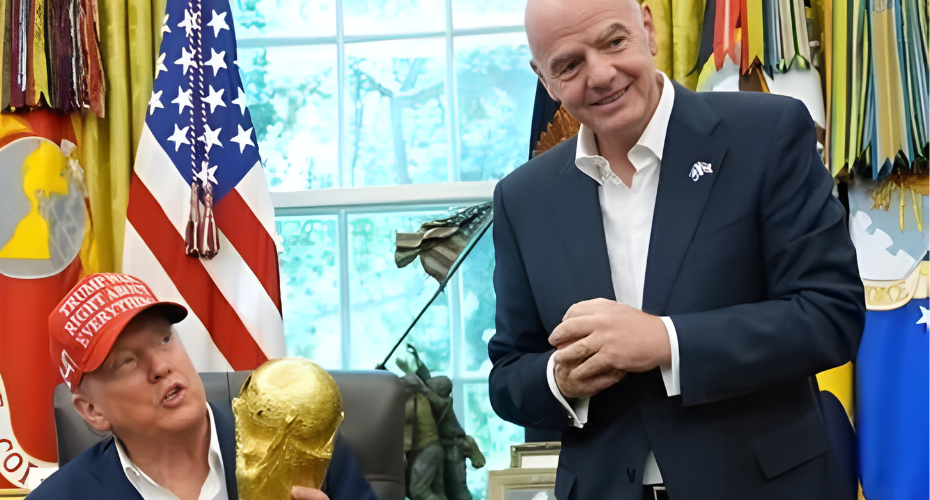FIFA President Gianni Infantino has been accused of breaching football’s core rule of political neutrality after publicly praising U.S. President Donald Trump and urging others to support his political agenda, comments now raising serious questions ahead of the 2026 World Cup in North America.
Speaking at the American Business Forum in Miami on Wednesday, an event also attended by Trump, Infantino lavished praise on the U.S. president and said “we should all support what he’s doing because I think it’s looking good.”
Former FIFA governance chief Miguel Maduro, who chaired FIFA’s governance committee between 2016 and 2017, said the remarks represent a “clear violation” of the organisation’s neutrality statutes.
At the event, Infantino told the audience:
“We have a great relationship. I’m really lucky. I have a great relationship with President Trump, where I consider him a really close friend. Of course he’s being very helpful in everything we are doing for the World Cup.
“He does things. He does what he says. He says what he thinks. He actually says what many people think as well, but maybe don’t dare to say and that’s why he’s so successful. I have to say it and I’m a bit surprised sometimes when we read some negative comments.
“I am not American, but as far as I understand, President Trump was elected in the United States of America and was quite clearly elected. When you are in such a great democracy as the United States of America, you should first of all respect the results of the election, right?
“In the end he was elected based on the programme, based on what he said.
“He is just implementing what he said he would do,” the FIFA president continued. “So I think we should all support what he’s doing because I think it’s looking pretty good.”
It is this final line that has prompted accusations of a breach of FIFA’s own statutes, which state: “FIFA remains neutral in matters of politics and religion. Exceptions may be made with regard to matters affected by FIFA’s statutory objectives.”
Maduro, a respected academic and former Portuguese government minister, told The Athletic:
“A debate could take place on the extent to which such obligation should extend to political positions taken when FIFA officials act in a private capacity.
“However, that is clearly not the case of the statement in question. It was made in his capacity as president of FIFA in an event he clearly participated in as FIFA president.
“I think a president of FIFA can state that electoral results should be respected. But Infantino went beyond that.
“The final part of his statement does more than recognising the legitimacy of President Trump, it endorses his political programme and actions and argues others should support them too. He is taking a position in what is an internal political debate in the U.S.
“While he can recognise the legitimacy of President Trump, he should also recognise that in a democracy, others can oppose his policies. To remain politically neutral requires not to take a position on that political debate, much less to argue that all should support President Trump’s policies.
“To do so appears a clear violation of the duty of political neutrality imposed on any FIFA official by Article 15 of its Code of Ethics.”
When approached for comment, FIFA declined to respond on whether Infantino’s words breached its neutrality statutes.
If an investigation is launched, it would fall under FIFA’s Ethics Committee, an independent judicial body responsible for investigating and ruling on the conduct of anyone bound by the FIFA Code of Ethics.
Possible sanctions range from warnings and fines to suspensions or bans from football-related activity.
The timing of Infantino’s comments has raised further attention. His praise for Trump came on the same day FIFA announced the new FIFA Peace Prize, an award intended to “recognise the outstanding contribution of those who work hard to end conflicts and bring people together in a spirit of peace.”
At the Miami event, Infantino even suggested that this award could be presented to Trump at the World Cup draw in Washington on December 5.
For travelling football fans and Secret Match Day readers, this controversy highlights once again how football and politics remain deeply intertwined, especially as the world looks ahead to the 2026 World Cup across the United States, Mexico, and Canada, a tournament that’s already shaping up to be one of the most politically charged in modern history.









